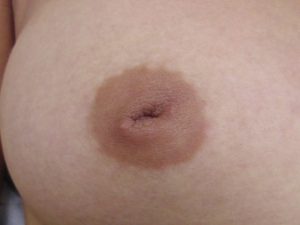Nipple Retraction: What It Is and When It Requires Evaluation
The Nipple retraction It is a common condition in which the nipple does not protrude outward but remains drawn inward. It may be… Congenital (present since birth) or Acquired, may occur in one or both breasts, and affect approximately 5% of women, often without association with pathological causes.
While in many cases there is no cause for concern, the sudden nipple retraction may represent a symptom of an underlying condition and should be promptly investigated by a specialist physician.

Types and Stages of Nipple Retraction
Nipple retraction is classified into three stages:
- Stage I:The nipple easily protrudes with gentle manipulation and remains everted.
- Stage II:Greater pressure is needed to evert the nipple, which then retracts back inward shortly after.
- Stage III:: The nipple remains permanently retracted, even with manipulation.
The congenital nipple retraction is usually identified during adolescence, often affects both breasts, and is associated with anatomical variations of the lactiferous ducts or fibrous tissue. In contrast, the acquired nipple retraction is a new finding in a woman with previously normal nipple projection and should be carefully evaluated.
Causes of Acquired Nipple Retraction
Acquired nipple retraction may result from:
- Inflammation of the lactiferous ducts (e.g., periductal mastitis, particularly in smokers)
- Duct ectasia (dilation of the milk ducts)
- Subareolar abscess or fistula
- Surgical trauma or injury
- Breast cancer, especially when located subareolarly or centrally within the breast
The diagnostic approach includes clinical examination, breast ultrasonography and mammography (in women over 30 years of age). The breast magnetic resonance imaging (MRI) is used when the previous examinations are non-diagnostic.
Can a woman with nipple retraction breastfeed?
Yes. Nipple retraction does not preclude breastfeeding. Many women with nipple retraction breastfeed successfully, especially with appropriate guidance from a lactation consultant or pediatrician. The use of specialized techniques or aids may facilitate the process.
Is nipple sensitivity affected?
In the vast majority of cases, nipple sensation remains normal, even in women with nipple retraction.
How is nipple retraction managed?
Treatment depends on the cause and severity of the retraction.
- If benign and not causing functional problems, treatment may not be necessary..
- In cases affecting body image or breastfeeding, options include:
Conservative approaches:
- Hoffman technique (manual traction)
- Use nipple suction devices or specialized nipple shields
Surgical correction:
- Fibrous tissue release and correction of nipple position
- Preservation or removal of lactiferous ducts, depending on future breastfeeding plans
- Minimally invasive techniques, including endoscopic approaches with minimal recovery time
Conclusion
Nipple retraction is a relatively common and often benign condition. Proper evaluation and individualized management are key to timely diagnosis and appropriate treatment selection.
At breastaware.gr, you will find reliable, scientifically grounded, and user-friendly information about all aspects of breast health. Stay informed, prevent, and care.
Bibliography:
- Dauplat J, Graff P, Lambert J, Moutardier V. Nipple retraction and breast cancer: when and how to investigate? Eur J Radiol. 2022;149:110229.
- Higgins S, Mahoney MC. Nipple Retraction: Evaluation and Management. Radiol Clin North Am. 2023;61(1):65-76.
- Rohrich RJ, Janis JE. Correction of the Inverted Nipple: A Graduated Approach. Plast Reconstr Surg. 2021;148(5):1202-1210.
- Keshtgar MRS, Williams NR. Breast signs and symptoms. In: Dixon JM, ed. Breast Surgery. London: Springer; 2020:101–117.
- National Health Service (NHS). Inverted nipples. 2024 [cited 2025 Jul 06].
